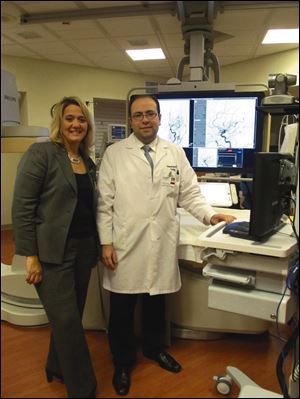
New technology helps smaller hospitals identify signs of a stroke
ProMedica uses Telestroke to help patients in remote locations
11/4/2013
Kelley Joseph, ProMedica’s regional stroke care coordinator, and Dr. Mouhammad Jumaa, director of the ProMedica Interventional Stroke Network.
Prompt medical treatment for stroke patients is crucial to their survival and improved technology is helping neurologists in heavily populated areas reach out to patients at smaller regional hospitals.
The issue is especially dire if a patient goes to the emergency room of a hospital that has a shortage of stroke specialists or is in a remote location. The outcome could be grim for the patient.
“When someone presents an ischemic stroke, due to a clot that lodged in a blood vessel in the brain, it’s only a short period of time to unblock the vessel,” said Dr. Mouhammad Jumaa, director of the ProMedica Interventional Stroke Network and assistant professor in the Department of Neurology at the University of Toledo. The sooner treatment is administered, “the better the outcome is. You want to treat as soon as possible.”
At Toledo Hospital, the ProMedica Stroke Network uses a computer called Telestroke to help patients in remote locations. The technology allows specialists such as Dr. Jumaa examine, assess, and recommend treatment for someone who is having a stoke miles away.
“The solution that we started presenting is to use technology to access stroke patients in local communities that don’t have access to experts,” he said. “So what we do is a two-way video and audio conference. We can perform a neurology exam. The patient and family can see me. The conference can happen within minutes of them arriving in the emergency department and the technology is secure.”
Kelley Joseph, ProMedica’s regional stroke care coordinator, said it’s difficult for small hospitals that don’t have a lot of neurology support to provide care for stroke patients that prevents permanent disability. While there is a shortage of neurologists, she said there is increasing awareness that stroke treatment requires immediate medical intervention.
Once a diagnosis is confirmed, Dr. Jumaa said a clot-busting drug can be given within the first four-and-a-half hours after a stroke onset.
With Telestroke, a camera in the emergency room at the remote location allows a neurologist to use an iPhone, iPad, or laptop to do a face-to-face meeting with a patient, doctor, and family. The doctor looks at test results and decides the best plan for the patient, Ms. Joseph said.
“About 50 percent of the time the patient stays in his own community at the smaller hospital where we have taught the health-care team to care for the stroke patient based on the recommendation of the American Stroke Association,” she added. “This is key in preventing patients from having more serious complications and hopefully less permanent deficits.”
More critically ill patients are transported to a hospital where they may receive greater medical intervention such as drugs, surgery, or other medical procedures.
“We’re working smarter instead of harder,” Ms. Joseph said about the program.
ProMedica’s Telestroke has been in operation for a year at Toledo Hospital and is linked with five hospitals. It first connected with Fostoria Hospital last November and is also connected with Promedica St. Luke’s Hospital in Maumee and Bellevue Hospital in Bellevue, Ohio. Promedica Bay Park Hospital and Hillsdale Hospital in Hillsdale, Mich., also will soon be online with Telestroke.
Mercy hospital system officials will also have the technology by the end of the year. Sarah Velliquette, media relations coordinator, said the hub will be at Mercy St. Vincent Medical Center and will first be linked to Mercy Tiffin Hospital. In addition to all of Mercy’s local and Tiffin facilities, Telestroke also will be connected to Mercy Willard Hospital.
Contact Rose Russell at: rrussell@theblade.com or 419-724-6178.